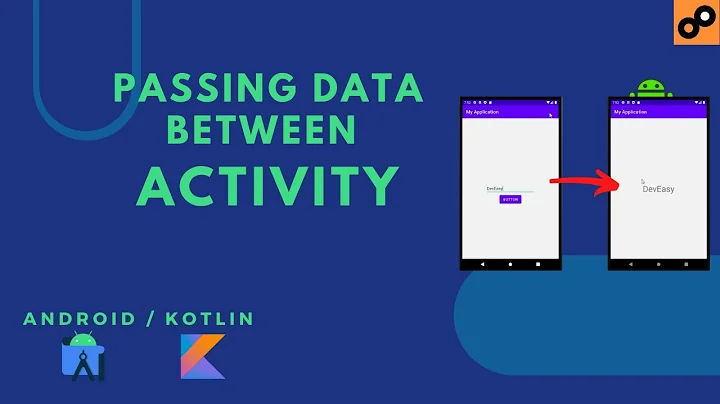Kotlin and new ActivityTestRule : The @Rule must be public
Solution 1
JUnit allows providing rules through a test class field or a getter method.
What you annotated is in Kotlin a property though, which JUnit won't recognize.
Here are the possible ways to specify a JUnit rule in Kotlin:
Through an annotated getter method
From M13, the annotation processor supports annotation targets. When you write
@Rule
public val mActivityRule: ActivityTestRule<MainActivity> = ActivityTestRule(javaClass<MainActivity>())
though, the annotation will use the property target by default (not visible to Java).
You can annotate the property getter however, which is also public and thus satisfies JUnit requirements for a rule getter:
@get:Rule
public val mActivityRule: ActivityTestRule<MainActivity> = ActivityTestRule(javaClass<MainActivity>())
Alternatively, you can define the rule with a function instead of a property (achieving manually the same result as with @get:Rule).
Through an annotated public field
Kotlin also allows since the beta candidate to deterministically compile properties to fields on the JVM, in which case the annotations and modifiers apply to the generated field. This is done using Kotlin's @JvmField property annotation as answered by @jkschneider.
Side note: be sure to prefix the Rule annotation with an @ character as it is now the only supported syntax for annotations, and avoid @publicField as it will soon be dropped.
Solution 2
With Kotlin 1.0.0+, this works:
@Rule @JvmField
val mActivityRule = ActivityTestRule(MainActivity::class.java)
Solution 3
Use this:
@get:Rule
var mActivityRule: ActivityTestRule<MainActivity> = ActivityTestRule(MainActivity::class.java)
Solution 4
Instead of @Rule , you should use @get:Rule.
Solution 5
With Kotlin 1.0.4:
val mActivityRule: ...
@Rule get
Related videos on Youtube
Comments
-
Geob-o-matic almost 2 years
I'm trying to make UI test for my android app in Kotlin. Since the new system using ActivityTestRule, I can't make it work: it compiles correctly, and at runtime, I get:
java.lang.Exception: The @Rule 'mActivityRule' must be public. at org.junit.internal.runners.rules.RuleFieldValidator.addError(RuleFieldValidator.java:90) at org.junit.internal.runners.rules.RuleFieldValidator.validatePublic(RuleFieldValidator.java:67) at org.junit.internal.runners.rules.RuleFieldValidator.validateField(RuleFieldValidator.java:55) at org.junit.internal.runners.rules.RuleFieldValidator.validate(RuleFieldValidator.java:50) at org.junit.runners.BlockJUnit4ClassRunner.validateFields(BlockJUnit4ClassRunner.java:170) at org.junit.runners.BlockJUnit4ClassRunner.collectInitializationErrors(BlockJUnit4ClassRunner.java:103) at org.junit.runners.ParentRunner.validate(ParentRunner.java:344) at org.junit.runners.ParentRunner.<init>(ParentRunner.java:74) at org.junit.runners.BlockJUnit4ClassRunner.<init>(BlockJUnit4ClassRunner.java:55) at android.support.test.internal.runner.junit4.AndroidJUnit4ClassRunner.<init>(AndroidJUnit4ClassRunner.java:38) at android.support.test.runner.AndroidJUnit4.<init>(AndroidJUnit4.java:36) at java.lang.reflect.Constructor.constructNative(Native Method) at java.lang.reflect.Constructor.newInstance(Constructor.java:417) at android.support.test.internal.runner.junit4.AndroidAnnotatedBuilder.buildAndroidRunner(AndroidAnnotatedBuilder.java:57) at android.support.test.internal.runner.junit4.AndroidAnnotatedBuilder.runnerForClass(AndroidAnnotatedBuilder.java:45) at org.junit.runners.model.RunnerBuilder.safeRunnerForClass(RunnerBuilder.java:57) at org.junit.internal.builders.AllDefaultPossibilitiesBuilder.runnerForClass(AllDefaultPossibilitiesBuilder.java:29) at org.junit.runner.Computer.getRunner(Computer.java:38) at org.junit.runner.Computer$1.runnerForClass(Computer.java:29) at org.junit.runners.model.RunnerBuilder.safeRunnerForClass(RunnerBuilder.java:57) at org.junit.runners.model.RunnerBuilder.runners(RunnerBuilder.java:98) at org.junit.runners.model.RunnerBuilder.runners(RunnerBuilder.java:84) at org.junit.runners.Suite.<init>(Suite.java:79) at org.junit.runner.Computer.getSuite(Computer.java:26) at android.support.test.internal.runner.TestRequestBuilder.classes(TestRequestBuilder.java:691) at android.support.test.internal.runner.TestRequestBuilder.build(TestRequestBuilder.java:654) at android.support.test.runner.AndroidJUnitRunner.buildRequest(AndroidJUnitRunner.java:329) at android.support.test.runner.AndroidJUnitRunner.onStart(AndroidJUnitRunner.java:226) at android.app.Instrumentation$InstrumentationThread.run(Instrumentation.java:1584)Here is how I declared mActivityRule:
RunWith(javaClass<AndroidJUnit4>()) LargeTest public class RadisTest { Rule public val mActivityRule: ActivityTestRule<MainActivity> = ActivityTestRule(javaClass<MainActivity>()) ... }It is already public :/
-
Andrey Breslav about 9 yearsCurrently, Kotlin does not support making fields that are backing properties public, but we are working on it
-
Geob-o-matic about 9 yearsIs there a bug tracking this?
-
Andrey Breslav about 9 years
-
-
Geob-o-matic over 8 yearsDoes it? I still get the error and it is public with M14 (0.14.449)
-
Geob-o-matic over 8 yearsseems to need @publicField, but it is deprecated, so I tried lateinit as suggested by IDE, but then it barks at me saying lateinit can be applied only on mutable (the blog's article says otherwise…)
-
desseim over 8 yearsUpdated my answer ;) As for
lateinit val, it has been removed in M14 since it didn't fully enforce the immutability of the field, see the [M14 release blog post](blog.jetbrains.com/kotlin/2015/10/kotlin-m14-is-out/). -
Rob over 8 yearsAnd it solved the problem of the lint tool complaining that the public was qualifier on the rule was redundant.
-
 Jignesh Ansodariya over 7 yearsThis does not provide an answer to the question. Once you have sufficient reputation you will be able to comment on any post; instead, provide answers that don't require clarification from the asker. - From Review
Jignesh Ansodariya over 7 yearsThis does not provide an answer to the question. Once you have sufficient reputation you will be able to comment on any post; instead, provide answers that don't require clarification from the asker. - From Review -
Praveer Gupta over 7 years@JigneshAnsodariya - I did a check and this answer provides an answer to what has been asked. More information on how this is working can be found at the following link - kotlinlang.org/docs/reference/…
-
 makovkastar over 6 yearsThere is a problem with this approach. If you want to access the activity under test (for example: assertTrue(activityRule.activity.isFinishing)), the property getter will be called, thus creating a new rule. In this case activityRule.activity will be null.
makovkastar over 6 yearsThere is a problem with this approach. If you want to access the activity under test (for example: assertTrue(activityRule.activity.isFinishing)), the property getter will be called, thus creating a new rule. In this case activityRule.activity will be null. -
 aleksandrbel almost 6 yearsWhat is @get: annotation? It also does not work in my situation.
aleksandrbel almost 6 yearsWhat is @get: annotation? It also does not work in my situation. -
Michał Ziobro over 5 yearsYes \@JvmField is crucial or use rather \@get:Rule
-
 Abhijit Sarkar over 5 yearsOnly works on final fields. Won't work for a rule like
Abhijit Sarkar over 5 yearsOnly works on final fields. Won't work for a rule likevar wireMockRule = WireMockRule(wireMockConfig().dynamicPort()). -
Peter Chaula about 5 yearsCare to add an explanation?
-
thegirlincode over 2 yearsAfter changing Rule to @get: Rule, it was fixed. Thanks


![How to Open a New Activity With a Button in Android Studio [Kotlin 2020]](https://i.ytimg.com/vi/4bEZ2PlIo8g/hq720.jpg?sqp=-oaymwEcCNAFEJQDSFXyq4qpAw4IARUAAIhCGAFwAcABBg==&rs=AOn4CLB58HNQXa8Owim_ePS7pYSe5BLtHQ)




